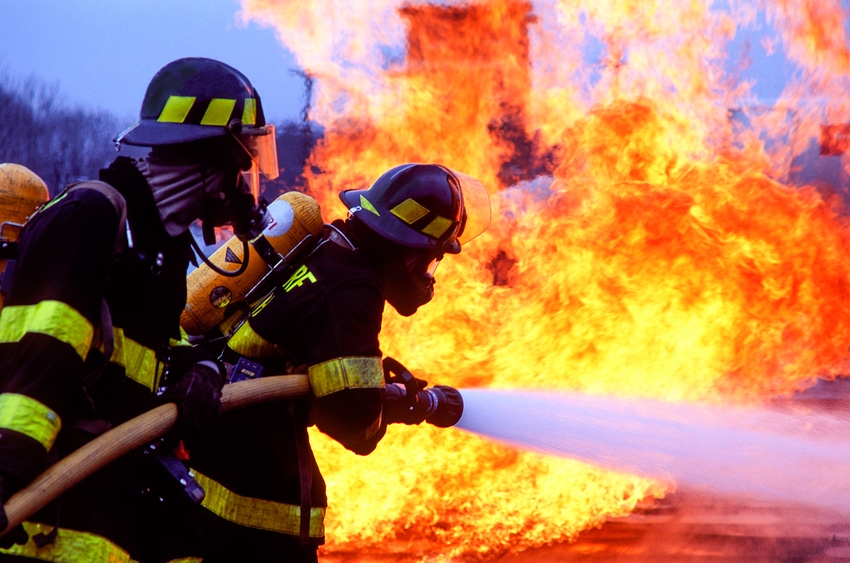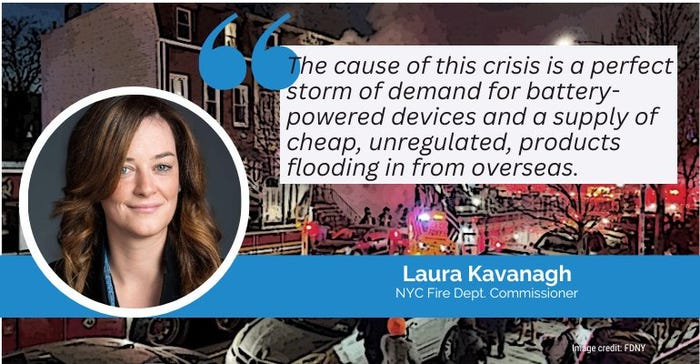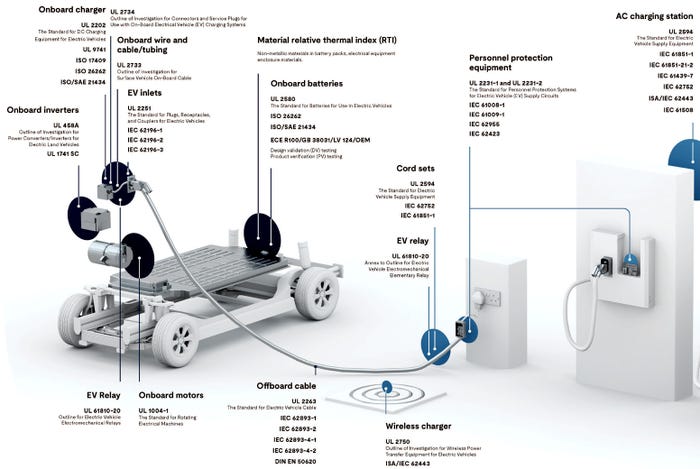NYC E-Bike Battery Fires Prompt Calls for National Legislation
Harlem battery explosion that killed journalist has reignited calls for national battery safety standards as a bill awaits congressional action.
March 11, 2024

At a Glance
- An explosion that took the life of a journalist in NYC was caused by an e-bike battery fire.
- Pressure is in industry and government to make stringent safety standards the law of the land in the US.
- Similar concerns are pushing stricter e-bike battery safety regulations in other nations, including China.
E-bikes and scooters, often labeled ‘micromobility devices’ are exploding in popularity. They are affordable, plentiful, and suitable, particularly in dense urban spaces, for a growing number of commercial tasks like package delivery, in addition to personal transportation needs.
They can also be deadly. On February 28, The New York Times named 27-year-old Fazil Khan as the first New York City death in 2024 caused by a lithium-ion e-bike battery exploding in his Harlem apartment building. In 2023, there were 18 NYC deaths connected to more than 250 fires.
“Reasons for the uptick of these fires are myriad,” the Times reported in a June 2023 article. “They include a lack of regulation and safety testing for individually owned devices, hazardous charging practices (like using mismatched equipment or overcharging) and a lack of secure charging areas in a population-dense city with numerous residential buildings, where most fires start.
“But for New Yorkers who rely on e-bikes and other battery-powered devices to make deliveries or otherwise earn a living, the fires have forced a choice between financial stability and personal safety.”
Unbranded, of unknown origin
Aim has quickly been taken at the flood of unbranded imported e-bikes, scooters, and the battery packs powering them. Many landlords blanketly ban e-bikes and scooters from their buildings. Last year, NYC fire officials revised the city fire code, now requiring buildings to provide safety measures, like a dedicated charging room with a sprinkler, when more than five e-bikes are charging.
But the fire code does not cover the individual use of e-bikes, and fire inspectors do not enter private apartments to check for safety violations without a warrant. So there are no safeguards to prevent what happened to Mr. Khan. According to the Times coverage, the fire began in one apartment on the third floor where there were several batteries, some of which were charging, said Jim Long, a spokesman for the NYC Fire Department. When the occupants fled, they appear to have left the door open, allowing the blaze and smoke to escape into the rest of the building, Mr. Long said.
Not a new issue
The issue of thermal runaway in lithium-ion batteries is not new. Last year Battery Technology reported, “In ideal conditions, the lithium-ion cells of a battery can dissipate the heat generated by the movement of electrons and ions to produce electricity. But in thermal runaway, battery cells are unstable, and temperatures rise at very fast rate, reaching extremely high values of approx. 752°F and causing materials inside the cell to start breaking down and decompose.
“The result can be fire, the release of toxic/flammable gases, and possible explosions.”
That’s from one of the more than 30 features on battery fires we’ve run in the past year.
Not NYC-specific
By no means is the problem of e-bike battery files limited to New York City. In January, representatives from Underwriters Laboratories (UL) Research Institutes, UL Standards & Engagement, and UL Solutions joined mayors from more than 1,400 U.S. cities in Washington, D.C. to discuss lithium-ion battery safety at the 92nd Winter Meeting of The United States Conference of Mayors. The panel discussion was led by ULRI Interim President and Chief Research Officer Dr. Chris Cramer with remarks from Commissioner of the Fire Department of New York City Laura Kavanagh, as well as Fairfax County Fire & Rescue Department Fire Chief and President of the International Association of Fire Chiefs, John S. Butler.

During the discussion, UL panelists explored how cities can manage the fire risks of lithium-ion batteries – addressing the dangers of these batteries and reviewing best practices for developing sound policies to ensure that lithium-ion batteries in e-mobility devices comply with recognized safety standards.
“The cause of this crisis is a perfect storm of demand for battery-powered devices and a supply of cheap, unregulated, products flooding in from overseas to meet this demand,” Kavanagh said. “These batteries are found everywhere—in your cell phones, laptops, power tools, solar devices, power packs, watches, and electric cars. When used properly and safely, their uses are endless. And yet, when used improperly, and particularly without regulation, all these seemingly benign technologies can quickly become major fire safety threats.”

Underwriters Laboratory diagrams safety standards that cover charging systems, connectors, relays, and more, in addition to batteries. Credit: UL Solutions.
She continued, “There is no city at this conference that has not had one of those fires. And those fires are particularly deadly.”
“What does this all lead to? It leads to trust,” UL’s Borlase said. “It leads to trust that if you have a battery that meets these consensus safety standards that were developed by experts, that were then tested and certified to meet that standard, that you can trust that that battery is safe compared to either the low-quality, counterfeit, tampered batteries that we are seeing cause a lot of the fires – not just in New York City, but in other places.”
National standards sought
Since late 2022, the Consumer Product Safety Commission (CPSC) has called on manufacturers of e-scooters, self-balancing scooters (hoverboards), e-bicycles and e-unicycles to review their product lines and ensure they comply with established voluntary safety standards or face possible enforcement action.
Now, Rep. Ritchie Torres (D-NY) has taken direct aim at batteries, sponsoring HR 1797, Setting Consumer Standards for Lithium-Ion Batteries Act. Introduced in March 2023, the bill was ordered to be reported out of committee by a vote of 42 yeas and 0 nays in the House Energy and Commerce Subcommittee on Innovation, Data, and Commerce this past December. Having attracted more than 20 House co-sponsors from California, Texas, and Louisiana, among others, it awaits being taken up by the full House.

HR 1797; 118th Congress being sworn in on on January 7, 2023. Credit: US House of Representantives
The bill would require the CPSC, “Not later than 180 days after the date of the enactment of this Act, to promulgate, under section 553 of title 5, United States Code, a final consumer product safety standard for rechargeable lithium-ion batteries used in micromobility devices within the jurisdiction of the Commission, including electric bicycles and electric scooters, to protect against the risk of fires caused by such batteries.”
As the battery standards would affect building codes and a wide range of consumer products, CPSC standards developers are meeting with other organizations including UL and the American National Standards Institute (ANSI) to further define their tasks.
Global action
Lest you think this is an ill-concealed screed against cheap and dangerous battery imports from China, a closing note. In late February the Global Times reported the Chinese public's concern about the safety of electric bicycle batteries has been growing, following a recent spate of battery fires. According to the latest media reports, China is set to introduce mandatory national standards on the matter.
At the national level, the mandatory national standard "Safety Technical Specification of Lithium-ion Battery for Electric Bicycle," which was drafted by the Ministry of Industry and Information Technology in 2022, has completed the drafting and consultation stage and is currently under review, according to China Central Television (CCTV).
About the Author(s)
You May Also Like





